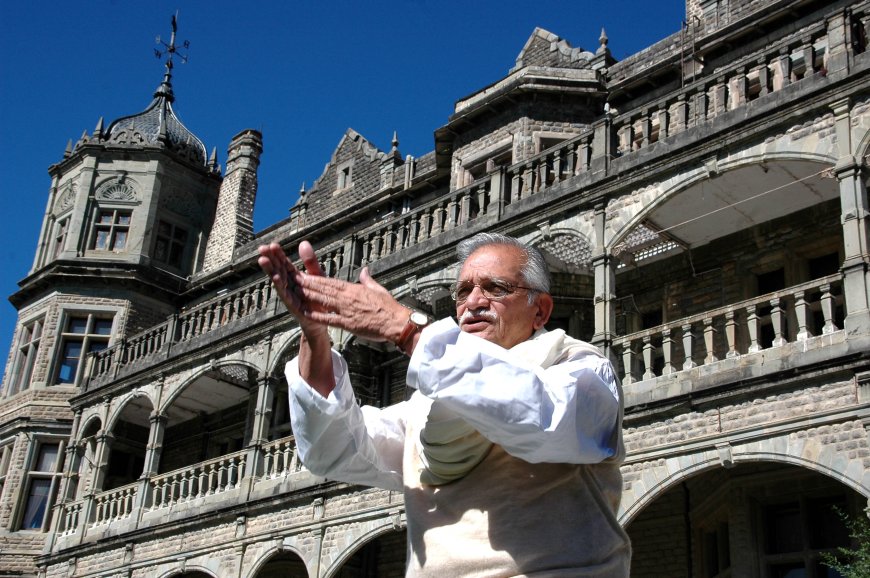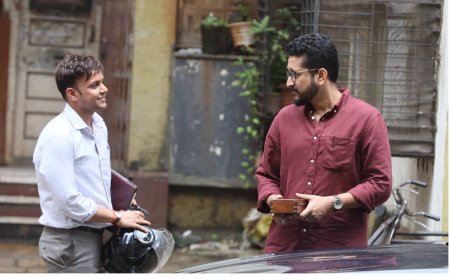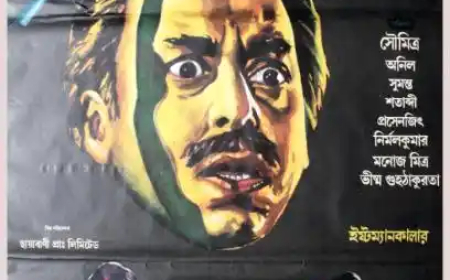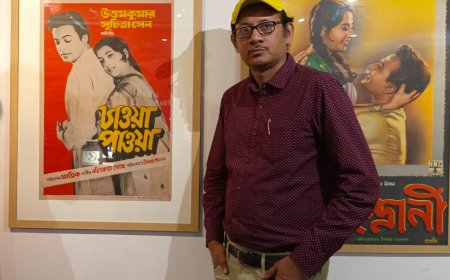JNANPEETH AWARD FOR GULZAR

The Jnanpeeth Award is the topmost literary award presented by the Bharatiya Jnanpith organization to Indian writers every instituted in the year 1961. It is given only to Indian writers who write in Indian languages and English. This year, among the three awardees of this Award, one is Gulzar, perhaps the first Indian to have won two top awards in two different areas of creativity – the Dadasaheb Phalke Award in 2014 for his rich contribution to Indian cinema and the Jnanpeeth Award for his work in literature – poetry, short stories, sketches, memorabilia, the works, in Urdu. With this award, Gulzar finds himself in the august company of creative writers who have devoted their entire lives to writing in their chosen language. Among them are names like the eminent Malayalam poet, Akkitham Achuthan Namboothiri, Nilamani Phookan, an Indian poet in Assamese language, Tarashankar Bandopadhyay, Mahasweta Devi, Sumitranandan Pant, Thakazi Sivasankara Pillai and many others.
The tribute focusses on Gulzar’s contribution to creative literature that goes beyond cultural, linguistic and other boundaries. He has given himself the name Gulzar to free it of any regional, communal and linguistic associations. He was christened with the name Sampooran Singh Kalra but got rid of it long ago and hates to reveal it to the media. He was born into a Sikh family, was married to a Bengali, Raakhee, the actress and writes in Urdu and Hindi.
Gulzar won the Sahitya Akademi Award for his rich contribution to literature some years ago. This was perhaps his first ever award away from the world of cinema where the award did not link his creations to his preoccupation with the celluloid universe. Those who are not familiar with Gulzar might have found this surprising. But for those who have known him personally, it did not. They took it as long overdue for this low-profile literary genius of Hindi literature for one, for Hindi cinema for another. The number of National Awards and Filmfare Awards he won, not to forget the Oscar for his lyrics in Slumdog Millionnaire is legendary. But they sit light on his handsome shoulders.
Tagore has always been a favourite with Gulzar, since he read Gardener, a Tagore short in translation. “One single-minded aim was to read Tagore in the original,” he elaborates, having learnt. to read and write Bengali. "My love for everything Bengali cuts across my life. I married Raakhee, a Bengali, perhaps in the hope of picking up the subtle nuances of the spoken language. I named my daughter Meghna, after a river in Bengal, now in Bangladesh. I have read my favourite Bengali writers and poets in the original.” Among his favourite poets, he names Tagore, Subhash Mukhopadhyay, Jibananda Das, Romanian poet Marin Sorescu, Mirza Ghalib, Faiz Ahmed Faiz and Ahmed Nadim Qasmi. Film-makers he respects are Satyajit Ray and Aparna Sen. He dedicated his book of short stories, entitled Michelangelo and Other Stories (2002) to Raakhee who he calls “the longest short story of my life.”
Born in Dina (now in Pakistan) a part of Jhelum district in 1934, Gulzar imbibed his love for Urdu and poetry from his Urdu teacher in Delhi's United Christian School "where Urdu was the medium of instruction till Independence." Much of his poetry is a nostalgic trip to his childhood where he talks about a tree on his way to school, or, of an empty can rolling on the streets. "I was not a good student at all and was frightfully scared of Mathematics. In a business family, I was the black sheep and by the time I entered college, I was given up as a lost case by my father because all my brothers were extremely brilliant. My father sincerely believed that I would end up attending Kavi Sammelans now and then, get some stipend or other from these and keep borrowing from him and from my more successful brothers.”
His films, with their soft lyricism, melodious music and a strange undercurrent of pain and rhythm, are his evocation to Love in all its myriad manifestations. Even in his latest film Maachis, this very sensitive director unspools a tale of love against the backdrop and in the midst of terrorism. Therefore, what could have evolved into a strong political film, changes tracks to turn into a tragic statement of love falling unwitting victim to terrorism in Punjab.
Gulzar - poet, lyricist, dialogue-writer and director has written stories for more than fifty films and songs for many more. His directorial roster has films on the pathos of living and on the triumph of human survival such as Mere Apne, Achanak, Aandhi, Koshish, Khushboo, Kinara, Meeraa, Parichay, Angoor, Kitaab, Namkeen, Lekin, Libaas, Maachis and Hututu. He has made television serials like Mirza Ghalib and Kirdaar besides creating biographical documentaries of outstanding merit. He has composed several volumes of poetry and used to publish a book for children every year to celebrate his daughter Meghna's birthday when she was growing up. His love for classical and contemporary Bengali literature comes across in his choice of inspiration for many of his films. Khushboo was adapted from a famous Sarat Chandra classic. Kitaab and Namkeen are both inspired by Samaresh Bose's novels. But like in Ijaazat, he often takes just a single thread of the original story and weaves it with some of his own creative thread into a rich tapestry of human relationships based on love. He also plays on the sitar.
At an informal talk at the Jaipur Literary Festival in 2016, Gulzar said, “the Jaipur Literature festival, he said: “It took me many long years to be accepted as a poet and prose writer because I was typecast as a lyricist and film director. However, discussions on my songs and films seem to chase me even at literary film festivals.” The poet of many seasons revealed that he had completed a translation of three volumes of Rabindranath Tagore’s poetry which was released later.. Gulzar recounted how he made acquaintance with Tagore’s poetry in his adolescence.
He also translated Tagore in Hindi which came out in the form of two books. “The Gardener” and “The Crescent Moon” are a compilation of some of Tagore’s most famous collections of verses. The original Bengali version and an English version of the poems were printed alongside Gulzar’s translations. The books were released in 2015 by no less than Pranab Mukhopadhyay, then the President of India. Another translation project he undertook was ‘A Poem a Day’ in which Gulzar translated some 400 poems by 270 writers of 32 different Indian languages into Hindustani consulting the poets when a language gap occurred.
Trying to be a functional single-parent 'mother' to daughter Bosky has been one of the happiest phases of Gulzar's life. "I learnt to tie her plaits, to get her ready for school because she lived with me throughout the week when she was small and spent the weekends with her mother" he says, wistfully. Then, at an interview, pulling out an anthology of poems which has one written by Meghna titled A Lifetime, points out a single line from the poem which goes "the sea swallows yet another sun". He sounds euphoric and suddenly, a new Gulzar emerges from behind this ambivalent man, the father in Gulzar, who basks in his daughter's love and glory, a Gulzar who is larger than the poet in him, the director in him, the lyricist in him, the dialogue-writer in him.
Monojit Lahiri, journalist and a noted celebrity of the ad world, writes: “A towering presence in the area of Indian literature, Gulzar is also rated as one of the finest Hindustani/Urdu poets with a collection that includes Pukhraj, Raat Pasmini Ki, Triveni, Yaar Julahe. His English translations include Selected Poems, Neglected Poems and Green Poems. He has also written several short stories and enchanting stories for children. This collection – Pluto Poems - emerged from a lamentation of the planet falling off the constellation, triggering verse of a kind only Gulzar can pen.”
Once, Gulzar elaborated on his writing thus: “When I write a poem, I first read it aloud to myself to see whether the emotional experience I am trying to convey is coming through. I put the poem away and do not look at it for a while. So, when I read it again, I hope to have some degree of objectivity and only then can I tell if the words are communicating what I intended to say. Before a story or poem is finished, I must believe it has ripened … haan pak gayi!”
What's Your Reaction?


































































